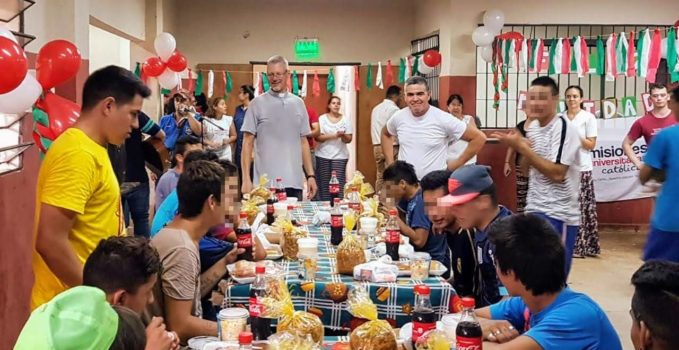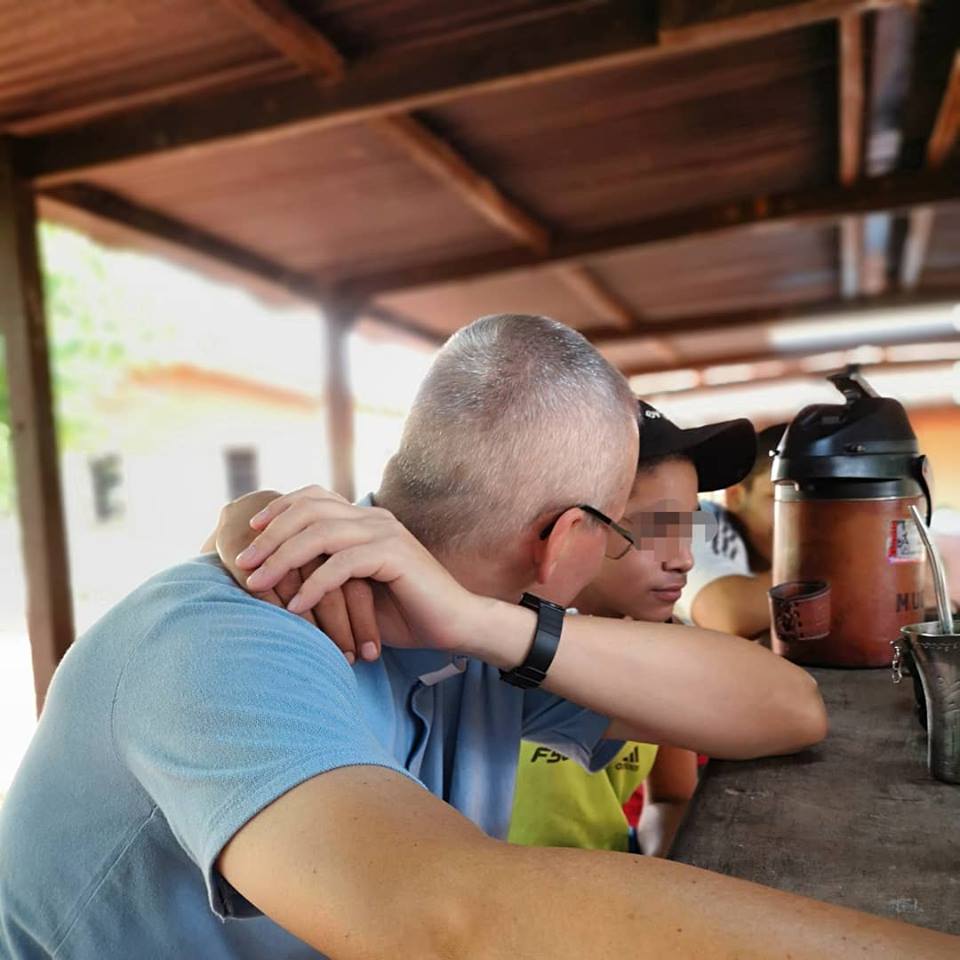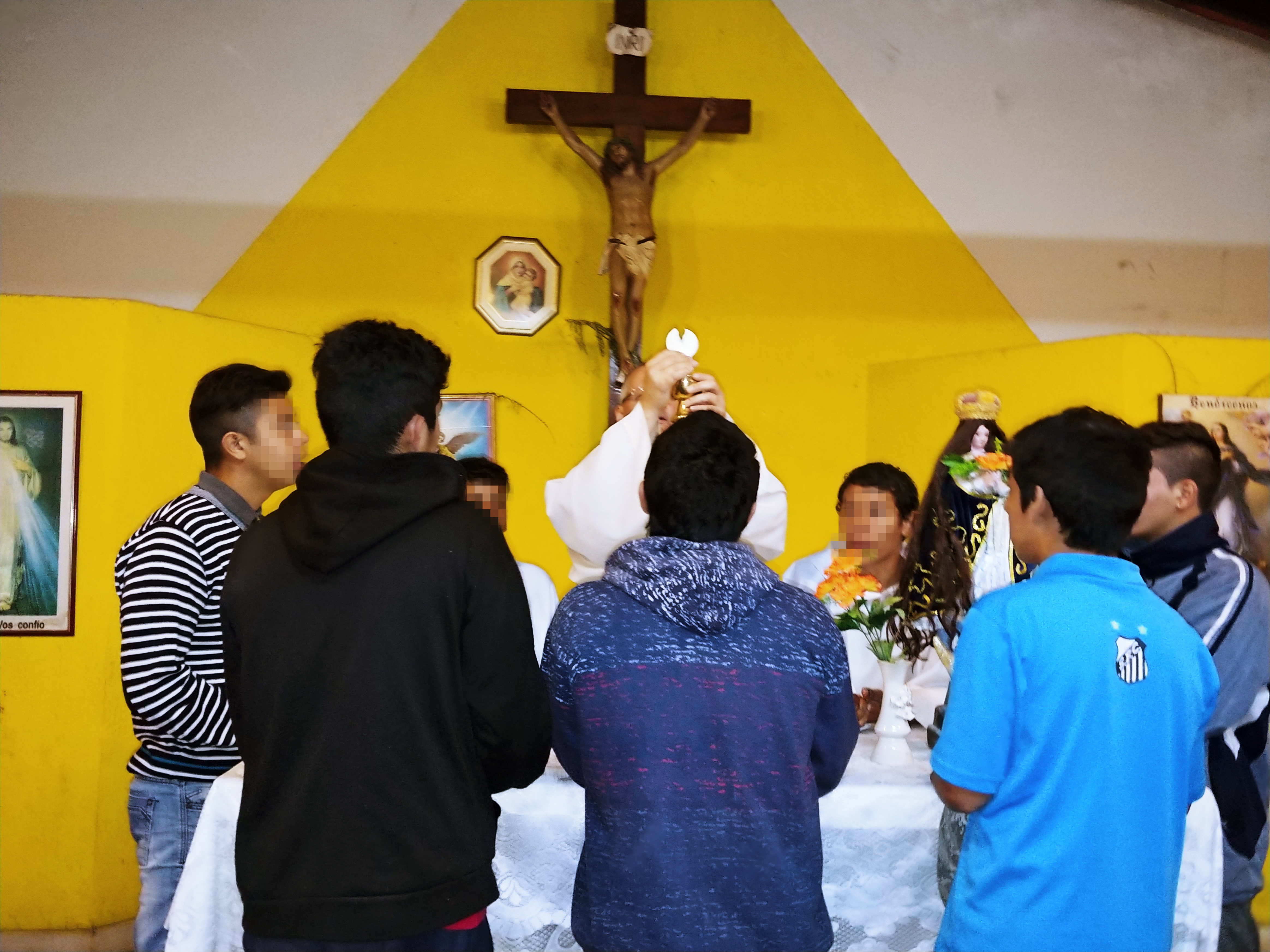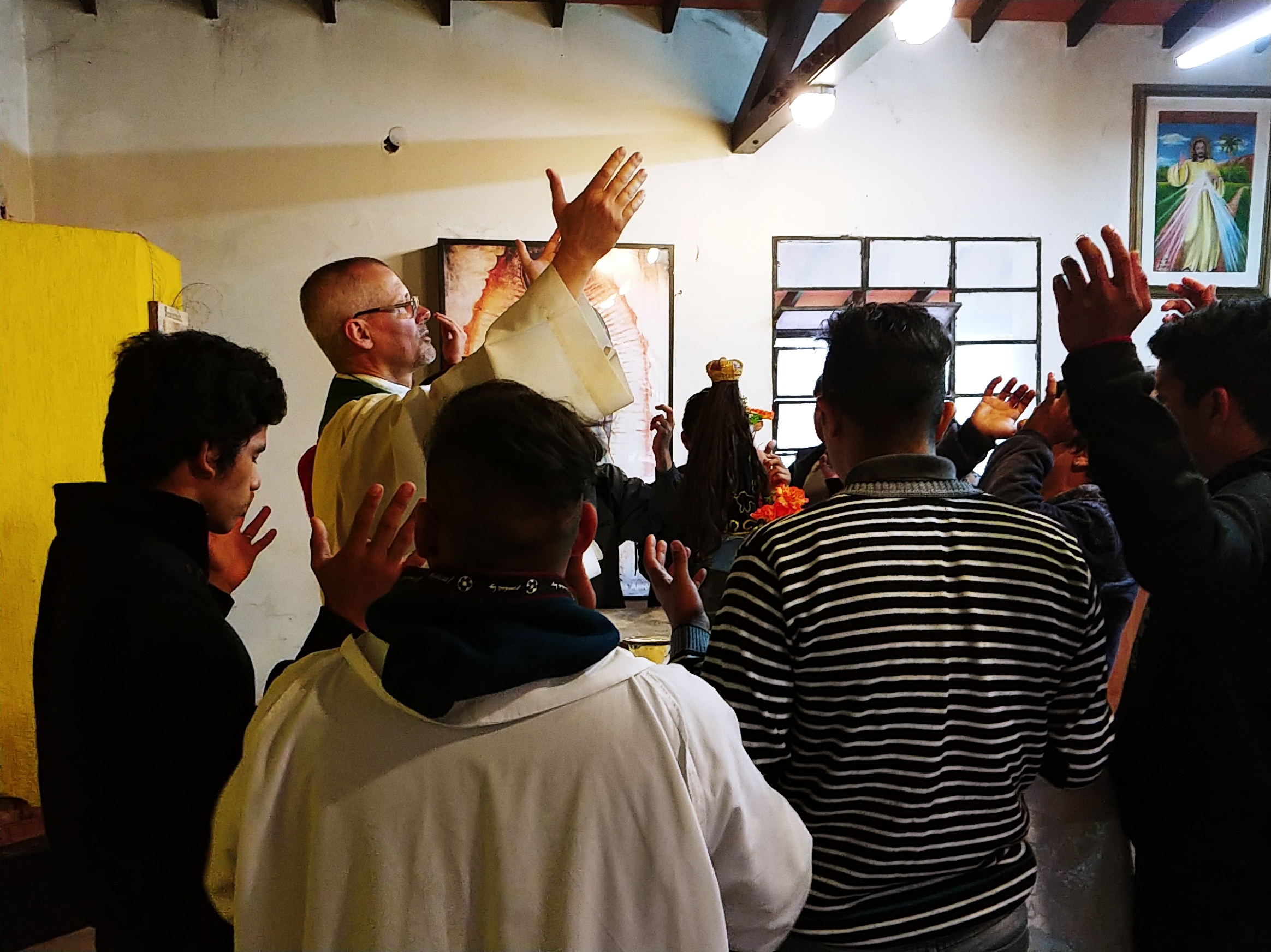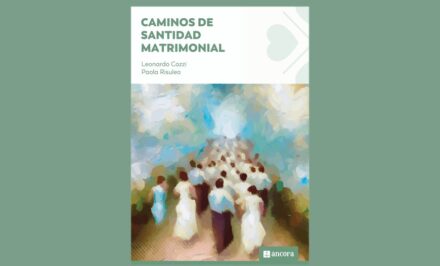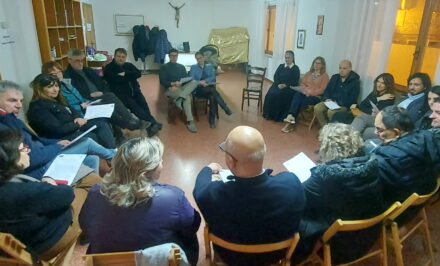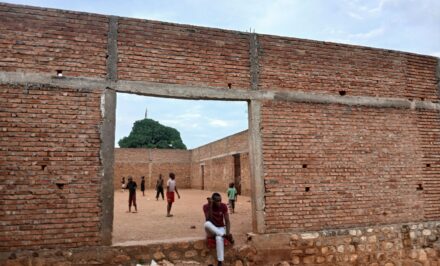Kentenich pedagogy on the outskirts, Fr. Pedro Kuhlcke •
“This is the aim of our education: to see to it that those entrusted to us have the disposition and the ability to live through one’s own motivation and initiative the life of a child of God:” demanding words for the Kentenich pedagogy on the outskirts. We share the experiences and conclusions of Fr. Pedro Kuhlcke in this text worked out from a conference for Tupãrenda’s Boys’ Youth. —
When your leader asked me to give a talk to the Boys’ Youth of Tupãrenda, I asked him: “What topic would the talk be on?” “And only on what you would want,” he answered. How complicated…! We’ll specify later, since we are completing the Father Kentenich Year: “We’ll talk about Father Kentenich’s pedagogy!”
Do you know this book? It is entitled “Pedagogical Texts,” it is a fantastic collection, very complete, of Father Kentenich’s texts which Father Herbert King edited (1). If you want to know something about Father Kentenich’s pedagogy, the easiest way is to simply study this book. It is only 570 pages…
I thought about sharing some of Father’s texts, but, especially, a very concrete application: What does this topic have to do with us? And what does this topic have to do with my task that I have had for more than four years now?
I am a chaplain of the “Centro Educativo Itauguá, CEI,” (Itauguá Education Center), the largest jail for adolescents in Paraguay. There you will find, more or less, 150 adolescents between the ages of 14 and 18; almost all drug addicts, almost all from dysfunctional families: children of single mothers, “abuela memby” (2) [reared by grandmother], or living directly on the street with no family support. They have no employment, no prospects for the future, their lives are a disaster, or they suffer the disaster their lives have always been.
In that very particular environment, we apply the pedagogy of Father Kentenich, and it works! That is most surprising: we apply what the Holy Spirit inspired Father Kentenich and which he applied many years ago to the youths like yourselves. Kentenich pedagogy functions today in Paraguay with the Boys’ Youth, with the Family Work, etc. And also functions in an environment… What does Pope Francis call that type of environment? The outskirts (periphery). In that periphery, which is what society in general forgets, ignores, rejects – there Blessed Mother also wants to educate and there also we realize that the pedagogy of the Father and Founder can be applied.
Father Kentenich Pedagogy
What is Kentenich pedagogy? Let us ask the Father and Founder himself!
“In creative summary, it came forth this way, with time, a consistent educational system… a complete pedagogy of covenant and attachments.” (3)
Surely you know the word “covenant.” Have you sealed your Covenant of Love?
We have to see that the Father Founder often speaks “complicatedly,” he uses many words. Each one is important, we have to analyze his phrases well to grasp what he wants to tell us.
“A complete pedagogy of covenant and attachments, a pedagogy of instrument piety and everyday sanctity which represents an original form of pedagogy of ideals and which contains… inexhaustible interweaving with the world of nature and of grace.”(4)
Is it all clear? Did you write it all down? These are many words but perhaps some of them resound more than others: Covenant, attachments, ideal, piety, instrument, and everyday sanctity… Or better yet, all we saw in Schoenstatt has to do with pedagogy. And Father made a whole system out of that.
Pedagogy of freedom
If we want to enter a bit into all of this world, we can read, for example, that the Father Founder speaks of “the pedagogy of ideals as a pedagogy of convictions, like a pedagogy of attitudes.”(5)
“This is the aim of our education: to see to it that those who have been entrusted to us have the disposition and the ability to live, through one’s own motivation and initiative, the life of a child of God.”(6)
Does it sound complicated? Or is everything understood? To see to it that those entrusted to us have the disposition – the desire, the decision, we could say – and the ability – the conviction to carry it out in practice – to live the life of a child of God, but through one’s own decision.
Before, everything was “easier.” For example, I don’t know, fifty years ago, on Sundays everyone went to Mass. And who did not go, better beware. He was catalogued as an atheist, sinner, or heretic, whatever. The mother was in charge of taking everyone, nobody missed. If someone did not go, the whole town frowned upon him.
Today it is more or less backwards. Somewhat shocked, they ask you: “Do you go to Mass? Every Sunday? And what about the Saturday binge (spree)?” Today it is not that “someone takes you to Mass” – if it does not come from you, if you do not have the personal conviction: “this is important to me, and I want to do it,” does not function. If you, in your school or university say: “I go to Mass every Sunday, I participate in a Catholic group meeting, I try to behave, I try not to drink too much alcohol, I don’t do drugs, I don’t have sex…” What would they tell you? At least: “Extraterrestrials, rare animals!” – or worse things.
Today to live as children of God, what is needed is a conviction, a disposition, and a decision: “I want to live this way!” Imagine that the text I recently read is from 1931. It has been almost 90 years since Father already would say that one is not simply Catholic because everyone is Catholic. To behave well, to follow God’s way, if it is not through one’s own conviction, is impossible. There are too many temptations out there. Do you know some temptation? Were you never offered a fino (marijuana cigarette)? (7) Today everybody knows where to get drugs. The fact that I do not consume drugs is because I decide and encourage myself to be “a rare animal.” If you tell a girl that you do not want to have sexual relations, what happens? She will automatically tell you: “What are you?’ – and we are not going to mention the words that might come after that question. That is what it is all about: personal conviction, I decide to live this way against all that society and my supposed “friends” tell me. I want to live this way. Father Kentenich calls that pedagogy of attitudes, of convictions.
What are essential are not a piety of practices, but a piety of convictions. For example, perhaps it is said in some Catholic school: “Today it is this course’s turn to go to confession and to Mass,” and all go by obligation. And when they leave school, they never go to Mass again. This is what Father Kentenich calls pedagogy of practices, pious practices, religious practices. In this regard, Father says that going to Mass because everyone goes and because it is obligatory, does not function. He proposes the piety of convictions: “I am a friend of Jesus and of the Blessed Mother because I decide to be so; I go to Mass because I decided to, for love of Jesus.”
Are you aware of what Father Founder’s pedagogy points to? Applying it in jail, I call it the “pedagogy of freedom.” Do you believe that there is freedom in jail? Everything is bars, guards, locks, obligatory times, etc. For us, jail ministry is the “space of freedom” within the jail. For me it would be very easy to say to the director: “Today I want for that entire pavilion to come to Mass, that the guards send me all the boys to Mass, and I will speak to them a bit and then for each one to return to his pavilion.” But since the beginning, we never did that. Religion is a space of freedom in jail, and if the boys want to participate, they should do it through conviction and not because someone obligates them to. Pedagogy of freedom in jail, pedagogy of conviction.
If a youth says: “I want to be baptized,” he must do it through personal conviction and not because I am going to give him a little gift if he gets baptized. There are groups from other religions who go to the jails, but conduct themselves differently. Suddenly the boys come and tell me: “Father, you know the other day, a pastor from another church came and told me that if I would get baptized in his church, he would buy me new clothes, he was going to take me out of jail, and was going to give me a job. What do you say to me? Should I go to that church? Because it is to my advantage, because he is going to take me out of jail and is going to give me a job.” I answer them: “It is your decision. If you want to change religions for a bit of clothing and for promises that may not even be fulfilled, go and do what you want.”
Sometimes they also come and ask me: “Father, if I get baptized, what are you going to give me?” “I am not going to give you anything! The best gift is baptism itself. If you want to be baptized or make your first communion, it will be your decision.” Sometimes I tell them jokingly: “I can give you two gifts, a blessing or a smack on the head.” (8)
When we began with the jail ministry in 2014, what first really caught my attention, and really touched my heart, was that immediately many youths approached and asked for confession. Normally the first question the priest asks in confession is: “When was your last confession?” Here I first had to learn to ask: “Are you baptized?” The majority did not know, but they did know if they had godparents or not. Truly many were not baptized and wanted to go to confession!
Can a person who is not baptized go to confession? Yes, of course he can go to confession! That is, he can tell what weighs in his heart. But I cannot give him God’s forgiveness— absolution— because baptism is the first of the sacraments. So then, we talk, the youth could pour out his woes— often for the first time in his life! —And I would give him a blessing. But then I would tell him: “OK, if truly you want God to cleanse your heart, that will only happen if you get baptized.” —Immediately the question follows!— “And when can I get baptized?”
I spoke to the bishop, and with his blessing we began to offer catechesis in preparation for baptism. Three months later, we had forty boys that were baptized! Forty! Not because we gave them little gifts, but because of a personal decision, through their own conviction. To do things well, we asked the youths to participate every Saturday in the catechesis. Of course, it is a short catechesis, very elementary, partly because we do not have much time at our disposal in jail, but especially because the attention span of a person who has consumed a great quantity of drugs is very limited. But they participated, through their own decision, through conviction, and they were baptized.
And do you know what they told me after being baptized? “OK, Father, and now what?” “OK, now would come first communion.” “And when will we do it?” Three months later, we had more than fifty first communions: One third of all in jail made first communion! But with this principle from Father. What are essential are not the practices: “they go to Mass every Sunday, guard, send them!” No, no! I offer Mass every Sunday I can – but if they go and participate, it is their decision.
Do you realize how Father’s pedagogy functions? It is something very real: it is authentic. And suddenly those boys are out of jail, they come to Tuparenda to integrate into our post-penitentiary program, and they tell me on their own initiative: “Father, I made my first communion in the CEI, do you remember? Now I want to continue here and make my confirmation.”
It is something free, not something imposed on them that is something fundamental in the pedagogy of freedom. Look at yourselves: why are you here today? How much were you paid? Father would say: “We are free rowers, we decided to row; we are not galley slaves with the chief and his whip behind us.”(9) And that freedom is so essential in Schoenstatt – and it also functions in a jail, which is like the antithesis of freedom.
First part of a talk for Boys’ Youth of Tuparenda
September 16, 2018
Fr. Pedro Kuhlcke
Transcript of the orginal Spanish: José Argüello, Asunción, Paraguay y Tita Andras, Vienna, Austria. Correction: Fr. Pedro Kühlcke.
(1) Herbert King (ed.). Joseph Kentenich: A presentation of his thinking in texts. Volume 5: Pedagogical texts. Ed. Nueva Patris, Santiago de Chile, 2008. Cited as “King.”
(2) “Grandmother’s child” – reared by the grandmother, generally with little or no contact with his/her parents.
(8) A little smack on the head
(9) Cfr. Prefounding Document, no. 19
Original Spanish. Translation: Carlos Cantú, Austin, Texas USA. Edited: Melissa Peña-Janknegt, Elgin, TX USA


